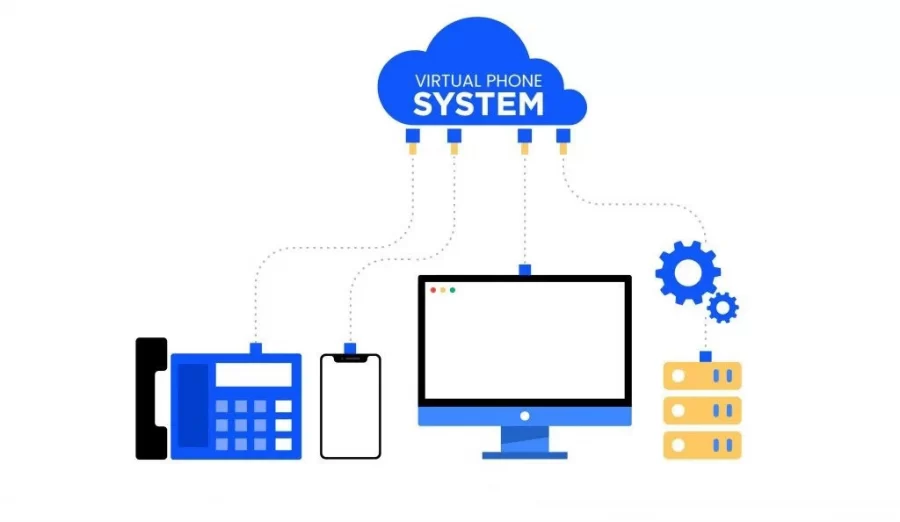In today’s fast-paced digital landscape, effective communication is vital for the success of any business. With the advent of technology, companies now have access to a wide array of tools and platforms to streamline their communication processes. One such tool that has gained significant traction in recent years is the virtual phone system.
What is a Virtual Phone System?
A virtual phone system, also known as a cloud-based phone system or VoIP (Voice over Internet Protocol) system, is a communication solution that enables businesses to make and receive calls over the Internet rather than traditional phone lines. Unlike conventional phone systems, which require hardware installations and complex wiring, virtual phone systems operate entirely in the cloud, offering flexibility, scalability, and cost-effectiveness.
Advantages of Virtual Phone Systems
Cost-Effectiveness
One of the primary benefits of using a virtual phone system is its cost-effectiveness. Traditional phone systems often entail high upfront costs for hardware installations and ongoing maintenance fees. In contrast, virtual phone systems typically have lower setup costs and subscription-based pricing models, making them more affordable for businesses of all sizes. Additionally, calls made through virtual phone systems are usually cheaper, especially for international calls, as they leverage the Internet for communication.
Flexibility and Scalability
Virtual phone systems offer unparalleled flexibility and scalability, allowing businesses to adapt their communication infrastructure according to their evolving needs. Whether you’re a small startup or a large enterprise, virtual phone systems can easily accommodate changes in the size of your workforce or business operations. With features like virtual extensions and mobile apps, employees can stay connected from anywhere, enabling remote work and enhancing productivity.
Advanced Features
Another significant advantage of virtual phone systems is their plethora of advanced features. From call forwarding and voicemail-to-email transcription to auto-attendants and call recording, virtual phone systems provide various functionalities to streamline communication processes and enhance customer service. These features empower businesses to deliver a seamless communication experience to clients and stakeholders, ultimately driving satisfaction and loyalty.
Utilizing Virtual Phone Systems for Business Communication
Incorporating a virtual phone system into your business communication strategy can revolutionize how you interact with customers, partners, and employees. Whether you’re managing a remote team, running a customer support center, or conducting sales calls, virtual phone systems offer the tools and capabilities needed to streamline communication workflows and maximize efficiency.
Remote Work Enablement
The rise of remote work has become a prevalent trend in recent years, accelerated further by the COVID-19 pandemic. Virtual phone systems play a pivotal role in enabling remote work by providing employees access to Company phone lines and communication tools from anywhere with an internet connection. Employees can stay connected and collaborate seamlessly through virtual phone systems, whether working from home, on the road, or in a different time zone.
Enhanced Customer Service
Effective communication is essential for delivering exceptional customer service. Virtual phone systems offer various features to enhance the customer experience, such as interactive voice response (IVR) systems, call queuing, and CRM integration. These functionalities enable businesses to route calls efficiently, prioritize customer inquiries, and access relevant customer data, resulting in quicker resolution times and higher satisfaction rates.
Unified Communication Channels
Consolidating communication channels is critical for maintaining consistency and coherence in business interactions. To create a unified communication ecosystem, virtual phone systems often integrate with other communication tools and platforms, such as email, messaging apps, and video conferencing software. By centralizing communication channels, businesses can streamline workflows, reduce silos, and foster collaboration across teams and departments.
Choosing the Right Virtual Phone System Provider
When selecting a virtual phone system for your business, choosing a reputable provider that offers the features, reliability, and support you need to succeed is essential. While numerous providers are in the market, not all virtual phone systems are created equal. Here are some factors to consider when evaluating virtual phone system providers:
Reliability and Uptime
Reliability is paramount when it comes to business communication. Look for a virtual phone system provider with a proven track record of uptime and reliability to ensure uninterrupted service for your business operations. Conduct thorough research, read reviews, and inquire about service level agreements (SLAs) to gauge the provider’s reliability.
Feature Set
Please evaluate the features and functionalities offered by each virtual phone system provider to determine whether they align with your business requirements. Consider essential features such as call routing, voicemail, conferencing, and mobile accessibility, as well as advanced capabilities like analytics, call recording, and integration options. Choose a provider with a robust feature set that caters to your needs.
Scalability and Flexibility
As your business grows and evolves, your communication needs may change. Ensure the virtual phone system provider offers scalability and flexibility to accommodate your expanding requirements. Look for customizable plans, scalable pricing models, and the ability to add or remove users and features as needed without disruption to your operations.
Security and Compliance
Security is a top priority when dealing with sensitive business communications. Choose a virtual phone system provider that prioritizes security and compliance, adhering to industry standards and regulations such as GDPR and HIPAA. Look for features like end-to-end encryption, secure data storage, and multi-factor authentication to safeguard your communications against cyber threats.
Conclusion
In conclusion, virtual phone systems offer a modern and efficient solution for business communication, empowering organizations to enhance productivity, streamline workflows, and deliver exceptional customer experiences. By leveraging the flexibility, scalability, and advanced features of virtual phone systems, businesses can stay ahead of the curve in today’s competitive landscape. When choosing a virtual phone system provider, prioritize reliability, feature set, scalability, and security to ensure a seamless communication experience for your organization. With the right virtual phone system, you can unlock new opportunities for growth and success in the digital age.
Consolidated Communications internet plans offer a reliable and high-speed internet connection, ideal for supporting virtual phone systems and other communication tools. Consolidated Communications allows businesses to enjoy seamless connectivity and robust communication solutions to drive efficiency and innovation.
Remember, effective communication is the cornerstone of business success. Embrace the power of virtual phone systems and elevate your communication strategy to new heights.
Also Read: The Biggest Internet Benefits You Need To Know In 2024








